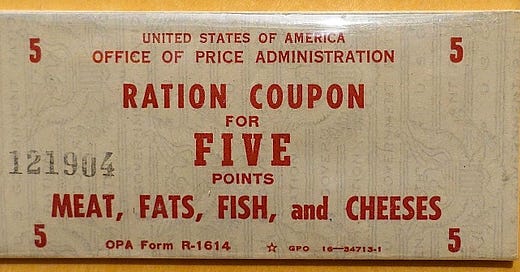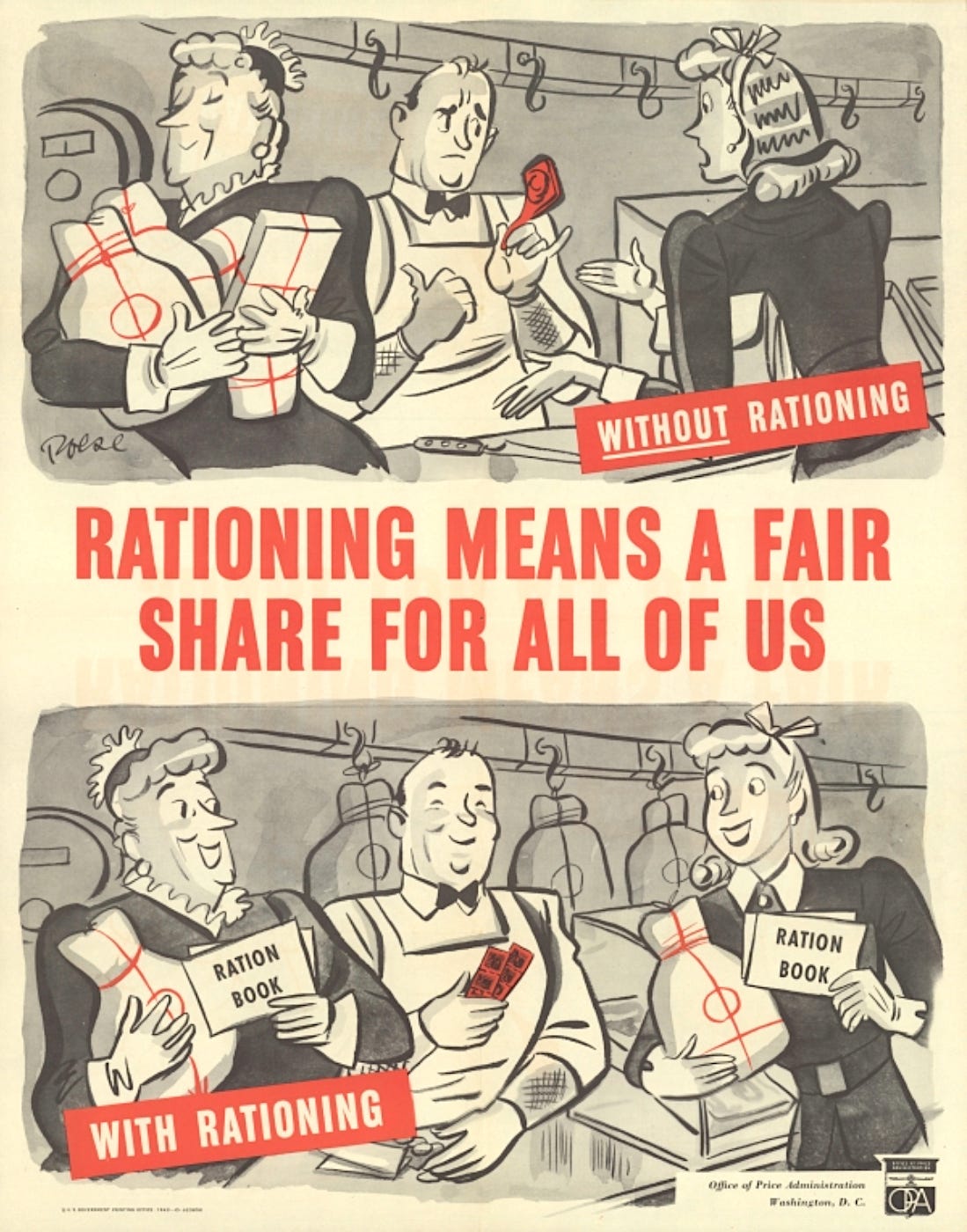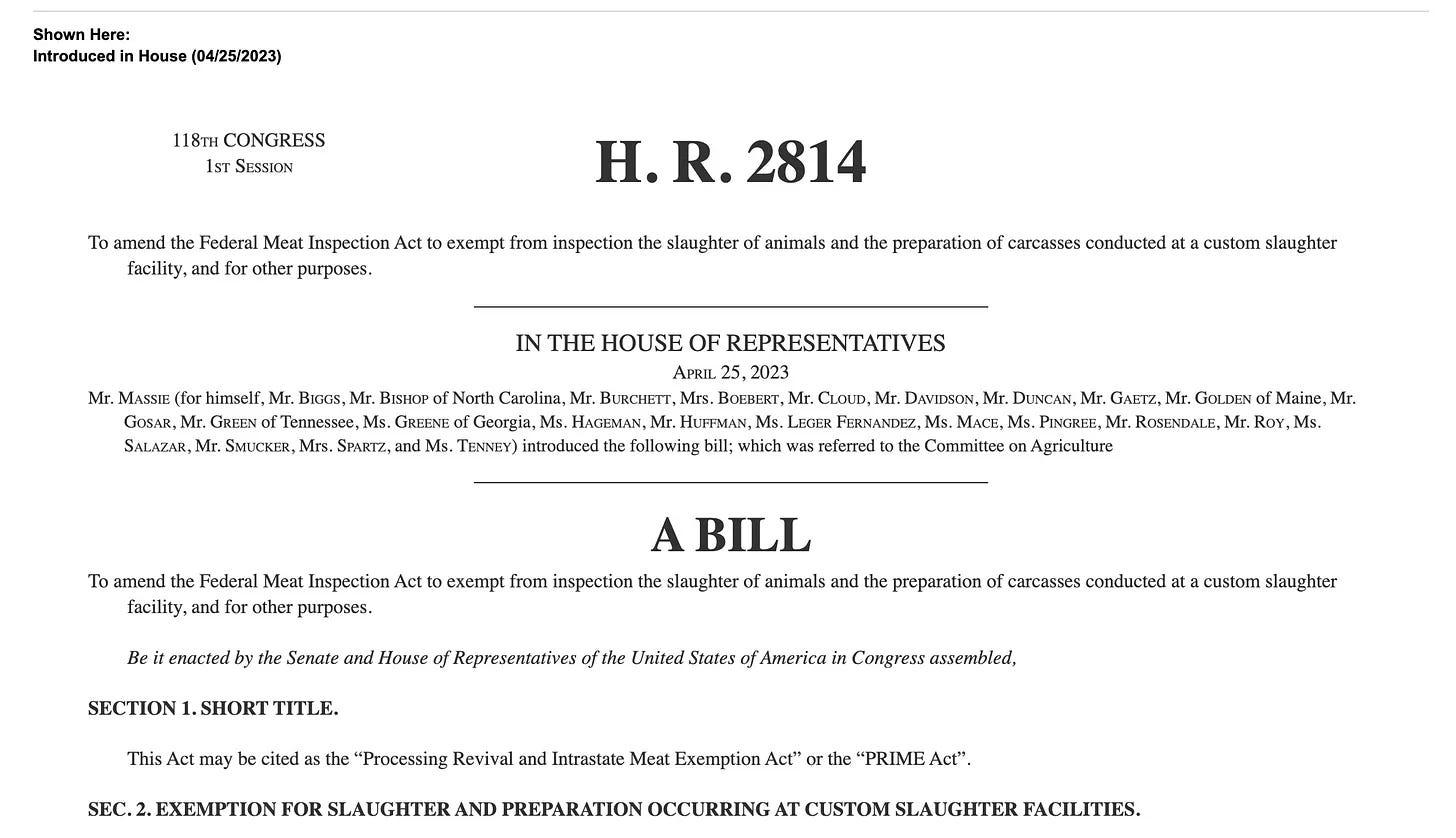When the government calls for meat rationing, what will YOU do?
Don’t look to history for lessons if you want the government to control what you eat.
Welcome to Raw Milk Mama, a newsletter about food freedom, our food systems, and how to create local food security in our communities. Sign up here for weekly posts, or keep reading...
WWII Rationing
Most of us alive today probably can’t imagine what it was like for our grandparents and great-grandparents generation during WWI and WWII.
Among the challenges they faced was food rationing.
Perhaps you’ve heard some tidbit here or there in regards to the rationing stamps needed to purchase meat, cheeses, and some fats.
During World Wars I and II, especially 1943-45 in the US, the government controlled meat sales. Americans were forced into a system where they used coupons or “stamps” to keep track of how much meat, cheese and fats they bought. Each American was allowed a specific amount.1
In order to accomplish this power grab, President Roosevelt created a new agency called the Office of Price Control. As you can imagine, it was designed to do just that–control prices.
“With the advent of the Emergency Price Control Act of 1942, the OPA became its own agency. Its powers included the rationing of items which were in short supply due to the war. Some of these included processed foods, meat, coffee, oil and gas, sugar, nylon, cars, tires and even shoes. Additionally, the OPA had the power to limit all prices with the exception of agricultural goods. At its high point, nearly 90 percent of U.S. retail food prices were held in check. Some financial assistance was also awarded to produce some of these commodities.”2 (TotallyHistory.com)
Ostensibly, this was a system designed to support our troops–they needed food as well, and, of course, were not able to produce food while traveling and fighting in the war. 3
This new rationing created the natural human response of resistance and dissent. This in turn, prompted freedom-loving Americans, and duplicitous businesses, to create an underground meat market. If the government was hyper controlling meat sales, it only made sense that desperate–or selfishly oriented–people would turn to alternative means of procuring food for themselves.4
But an underground black market invariably favors a myriad of unscrupulous players who are all-too-willing to be dishonest in their dealings. This was not the solution.
Could Price Fixing happen today?
Think this is far off in today’s world? In fact it is not. There are ongoing calls to create something similar today to help control inflationary food prices.5
When you consider that during the 1940s, there was still a healthy population of American farms, it made sense that these farms could produce enough to support Americans here at home and the troops fighting in WWII–even with rationing.
Some estimate the number of farmers we have now in the US is only 2% of our total population. Only 2% hold the wisdom, hold or have access to the land, and have the capacity to produce our food.
But even fewer know how to process our meat.
“In 2022, there were approximately 129,500 butchers and meat cutters in the United States. In the same year, butchers and meat cutters in the United States earned on average approximately 18 U.S. dollars per hour.”6
With this scarcity of butchers, what happens when–not if, but WHEN–the government forces rationing on us in this century?
Bringing Back Rationing
Global NGOs, governments and climate crisis extremists are already screeching about meat causing climate change and the need to bring back WWII era rationing and controls.
Right now, it is voluntary to give up meat in America. The propaganda against meat gains momentum every day, but it is still “voluntary.”
What will you do when it’s not voluntary?
It’s not a far off premise.
And it won’t take much.
The propaganda against meat–lumping together sustainably and humanely produced and processed meat with CAFO meat–grows stronger exponentially.7
It is only a matter of time before the propaganda against meat becomes too strong or government mandates force Americans into making changes that we have not agreed to (anyone remember COVID?).
It is not the government’s right to control what you or I eat–especially by rationing. Nor is it in our best interest to allow another black market–often the most dishonest–to lead a “resistance.”
Other Vulnerabilities
Perhaps meat rationing won’t be mandated and enforced, but rather caused by “weak points” in the system.
There are 3 major vulnerabilities that could immediately and effectively shut down meat distribution in our country:
Breakdown of aging and dilapidated infrastructure.
An enemy of the American people, foreign or domestic, hacking into our systems or causing other disruptions.
A government mandate (or incentive) for the 4 companies controlling 85% of our meat to shutdown or shift their focus to something else.
No joke
The meat monopoly in the US is no joke. 4 companies control 85% of the meat produced and processed here.
They control the farms and ranches where this meat is produced through contracts.
They control the slaughterhouses where this meat is processed.
They control the prices that you and I pay for meat.
With this level of market control over the food available to us, “rationing” will be easy.
There will be little need for enforcement at that point. The “enforcement” comes from the real and true lack of availability and blocks at the major choke points such as:
Aging farming population.
Not enough slaughter facilities and too far apart.
Centralized production, centralized processing and long distance transportation.
If you are happy with this scenario, then don’t do anything. Keep doing what you’re doing. The only thing I can guarantee is that it won’t end well.
Resisting before it’s too late
If the idea of the government or NGOs controlling what you are (and are not) allowed to eat, gives you chills, then it’s time to step up.
We need to bring back local, custom slaughter options.
We need to decentralize our supply.
We need to rely on communities to produce and process their own food–especially meat.
What can we do NOW?
A key factor is to immediately make meat processing options more available to farms and ranches so that small farms–which is what we desperately need right now–do not need to rely on the whims of the control freaks in government and the non-governmental organizations.
We can play the “what if” scenario all day long.
But we don’t have to. We have history! We see the historical propaganda from the WWII era and we can easily see the current narrative today:
“Animal agriculture causes climate change. Be very afraid and rely on the government and global NGOs to fix it. If you do not voluntarily ration what you consume, we will force you.”
Friends, this will never work.
Centralized control always fails. But it causes much suffering in the process.
Must we embark down this road to see how treacherous it is, or are we willing to make changes to our system while we have time–before the controls and rationing set in?
We have a solution staring us in the face.
We must act upon it now.
The PRIME Act is about your freedom to choose the foods you eat.
But if you don’t want to choose your foods, then hey, keep ignoring it. I know a few organizations that have some bugs to sell you.
For those willing to stand and fight, we have the tool we need in the PRIME Act, we have our voices, and we must use them.
About Raw Milk Mama: I believe in the freedom to feed our families how we see fit. I also see the direction that our country is going--no one wants to live in a world where food scarcity is a constant reality. It's time to take back our food systems so they serve us, not monopolistic corporations.










Thank you for covering this topic. The PRIME act sounds great. Unfortunately I gave up hope a long time ago in our elected representatives doing anything useful for the country. I’ll still contact them about PRIME but I wish there was another way.